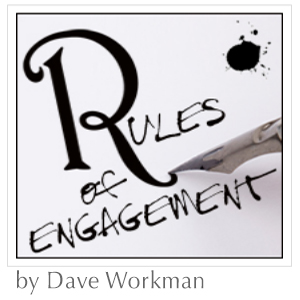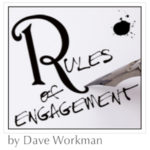.
 A notebook for fiction writers and aspiring novelists. One editor’s perspective.
A notebook for fiction writers and aspiring novelists. One editor’s perspective.
Next post • Previous post •Index
Writing Great Dialogue (Part 5)
Writing Dialogue/Monologue in
First Person POV
When I write a novel in First Person (1P) POV, I’m telling my story solely through my protagonist’s inner (as in monologue) voice, from my book’s first word to the last. My protagonist is speaking either directly to the reader, or to him/herself (much like when journaling) and, as the author, I’ve thrown the omniscient narrator out the proverbial window. There’s no unseen, omnipotent voice revealing information unknown to my protagonist. My narrator cannot be aware of what lies beyond his/her perception, nor is aware of other characters’ unspoken feelings, intentions or conspiracies.
And what really pops my bubble is this: One can also assume that any dialogue my protagonist chooses to reveal is not actually character-to-character dialogue. It’s simply my protagonist relating to the reader what words are possibly/probably being spoken. Essentially, more internal monologue. Theoretically, my protagonist might deny the reader specific information, or may even lie to the reader…should the plot dictate that the reader remain misdirected.
For instance, is the dialog below….
…..“I only arrived in town last night,” I said. “Why do you ask?”
…..“Because John Blayne was killed early Friday evening. Somebody matching your description was seen running from the crime scene.”
…..“Well, it wasn’t me, sheriff. I can promise you that.”
…..“And you have an alibi, Mr. Martinez?”
…..“Of course not,” I said with a cautious frown. “Until this moment, I didn’t think I needed one.”
…the truth or a lie? For all we know, Martinez may have killed the dude, but he’s unwilling to confess, even to the reader. Worse, he may have convinced himself that he didn’t kill John Blayne. Meaning that Martinez might be written as an unreliable narrator.* Readers won’t know for certain if he’s telling the absolute truth, unless otherwise informed by Martinez himself. Crazy, right?
But I do love writing in First Person POV. It’s my favorite literary voice. I love the option of creating that potentially unreliable narrator—or at least of leaving a sliver of a doubt in my reader’s mind. I also love my ability to use a distinct (clever, cunning, cynical, crazy—and I mean like totally, off-the-wall crazy) voice. I love the option to blow off those many down-to-earth restrictions while writing in an omniscient voice.
For instance, should I decide to describe my initial, distant glimpse of the city of San Francisco as “resembling a 3-day-old birthday cake left out in the sun to melt,” I can do so with firm authority and a twisted panache. Screw those literalists who demand to see paragraph after paragraph of authentic description—all those cramped skyscrapers rising into the heavens, gleaming in the hot summer afternoon. As the book’s narrator, I can scene-set, reveal other characters’ unflattering quirks, and even unspool the plot in any manner (back to front? Sideways? Through an LSD haze?) that I damn well please. First Person POV readers aren’t expecting absolute authenticity so much as absolute personality. Conversations (e.g.; dialogue) should be very distinctive.
Okay… and that’s a new rule as well. Hence Rule #45: First Person POV readers aren’t expecting absolute authenticity so much as absolute personality. When writing in 1P, maximize your character’s personality.
As a 1P protagonist, I can whisper my secrets directly to the reader. I can hate my mother, abhor small children, kick puppies, fear the color mauve, have several dismembered bodies buried in the basement and still—by all outward appearances—appear normal, caring and actually somewhat sophisticated. The reader can be aware of these secrets (if told by the author), but unless my protagonist shares such info via dialogue, other characters won’t have a clue.
Writing in 1P, I can also dig far more deeply into my character’s psyche; into any number of psychoses (should I give my protagonist an issue or two) and I can dive wayyyyy down into the dark room of his/her soul. I can then resurface, revealing whatever jetsam and flotsam I might find there. And, when writing in 1P, I’d better find some interesting shit to divulge. That’s both the joy of writing in First Person and reading fiction in 1P as well.
Don’t be surprised if you (as author) find yourself slipping into co-habitation mode with your on-page alter-ego—whether you directly identify with him/her or not. You’re impersonating someone else, after all—for all intents and purposes, another human being. As the voice of my protagonist, I can discreetly reveal to the reader that my Great Aunt Lucy smells like formaldehyde. Or that I haven’t paid my taxes in eight years. That I’m about to murder the man who raped my sister. I can even whisper my uncertain suicidal tendencies—sharing a most profound secret with the reader, unafraid that some other character might overhear my thoughts and step in with a pat on the head and an a handful of antidepressants.
Sure, I can write about my Great Aunt Lucy similarly in 3P POV, superficially revealing much of the same information—but writing in 1P allows you (imho) to more fully share these feelings. Your protagonist can internalize a great deal more, and thus deliver a far more profound psychological impact on the reader. (Should you so desire.) Such intimacy can provide a far more profound, and personally exhilarating, writing experience. (Sometimes writing in 1P can feel pretty much like self-therapy.) Because, know it or not, you’re delving into your own soul as well.
Ah, but what about dialogue, you ask?
On the surface, one might assume that dialogue is dialogue. That writing dialogue in 3P is no different than dialogue in 1P:
…..“You’re looking lovely today, Suzanne,” Paul said.
…..“You’re looking lovely today, Suzanne,” I said.
But a funny thing happens when you begin to inhabit a 1P character who’s begun to feel at home in your brain. Writers will begin to re-think their words to better match the texture of their protagonist’s personality. In a way, it’s like channeling Elvis. So, “You’re looking lovely today Suzanne,” Paul said(.), can morph into:
…..“Have I ever told you, Suzanne, that whenever you look at me, I melt a little inside?”
I speak from personal experience. Several years ago I began writing a book about a guy living in San Diego who wanted to a screenwriter. I began writing in 3P, but my character seemed to sputter about a dozen pages in. And then I had a revelation. After all, I was a guy living in San Diego trying to write a screenplay. Feeling that sort of close, warm and fuzzy kinship with my protagonist, I began re-writing the book in 1P. For awhile I felt very self-conscious, like I’d been leaving the bedroom drapes open at night and the neighbors were clandestinely peeking in. And this guy in my head, whom I’d named Charlie, wasn’t me. He was both far braver and far more stupid than I. Yet, after a dozen or so pages, I forgot about me being me and freely gave my unconscious self over to Charlie. His manner of speaking changed. His cadence changed. Even his vocabulary changed. (That part was particularly freaky. He was using words that I didn’t even know I knew. Seriously.) And I think the story is far better for having made that transition.
I often tell people who ask that I don’t choose my characters as much as they choose me. And Charlie’s one guy who can prove it.
– – – – –
* Unreliable narrator: A character or voice (most often found in 1P POV) who is, or may be, intentionally fabricating some, most or all of the story. Typically in 3P POV, the reader assumes that the story’s characters (and, of course, their sage puppet master) are telling the absolute truth—because, why the hell not? In those instances when a criminal, maniac, small child, captive…etc. is speaking, the reader can be made aware by the author (or simply through the veracity of the dialogue) that falsehoods abound. However, in 1P novels, it’s quite possible for the author to be intentionally manipulating the reader with the apparent sincerity of a saint. All along, however, and only toward the novel’s completion—if ever—does the reader discover that we’ve been fooled or outwitted by the narrator. And hopefully to the betterment of the book.
Next post • Previous post • Index
 A notebook for fiction writers and aspiring novelists. One editor’s perspective.
A notebook for fiction writers and aspiring novelists. One editor’s perspective.